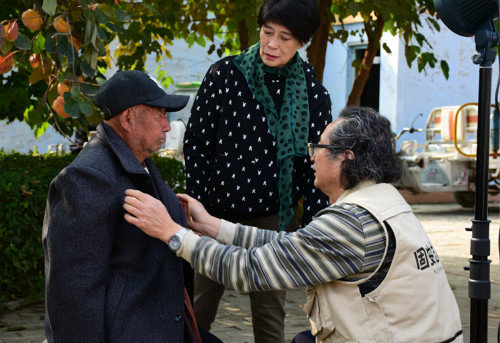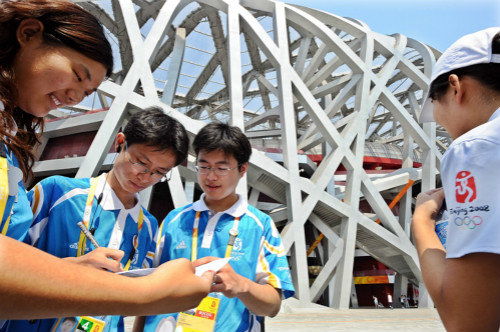Voluntary Sector Seeks Greater Efficiency, More Expertise
 |
| Wang Zhiyong (right), a retired reporter, helps a senior with his coat before taking his portrait at a nursing home in Gu'an, Hubei province, in October. [China Daily] |
This is the penultimate story in a series reflecting China's achievements in a range of fields, including science, law enforcement, education and transportation, resulting from 40 years of the reform and opening-up policy.
The number of skilled volunteers has soared in the past decade, but growth remains slow. Li Lei reports from Gu'an, Hebei.
On the morning of Oct 17, retired reporter Wang Zhiyong set out from Gu'an, a small town in Hebei province, to visit a nearby nursing home. It was the Chongyang Festival, the ninth day of the ninth lunar month, when China's senior population is feted.
The 62-year-old took his camera, a color printer and some costumes for a photo shoot. Two other photographers and six beauticians traveled with him to provide the home's 34 elderly residents - many of them childless and on State benefits - with portraits as gifts.
"Many had rarely been photographed before," said Wang, head of a team of 90 amateur photographers who use their skills to create meaningful images.
In the nursing home's compound, the photographers dressed the residents in red scarves or jaunty hats, while Wang told jokes and made amusing gestures to ensure they were smiling when the photos were taken.
"I had a strong sense of fulfillment when I printed the portraits, put them in frames, gave them to the seniors and saw them overwhelmed by surprise," Wang said, adding that the joy prompted by the portraits far outweighed the cost of 10 yuan ($1.45) per photo.
Wang is one of a growing number of volunteers who use the skills they have acquired through their work or hobbies to provide voluntary services.
According to experts, the relatively new trend can ameliorate social problems such as loneliness, and help the volunteers achieve a sense of satisfaction.
Legal Provision
Dec 1 marked the first anniversary of the Voluntary Service Ordinance, China's first legal provision dedicated to safeguarding the rights of people involved in voluntary work and establishing standards in a field that has expanded rapidly in the past decade.
To maximize the value of voluntary work, the ordinance encourages government agencies, businesses and NGOs to recruit volunteers who can provide skills-based services.
By the end of November, more than 100 million Chinese had registered as volunteers and 120,000 NGOs were providing voluntary services, according to the Ministry of Civil Affairs, which oversees the endeavors.
The high number of volunteers is a stark contrast to the situation 40 years ago when China adopted the reform and opening-up policy. At the time, the concept of voluntary work was almost unknown.
The adoption of the policy kick-started decades of rapid economic growth that laid the foundation for China to become the world's second-largest economy and opened people's minds to fresh ideas.
Some experts have said that the growth of the voluntary sector is a result of the changes that started in 1978 and helped drive economic expansion.
Tan Jianguang, vice-president of the China Young Volunteers Association, which was founded in 1994, said the country's voluntary sector has grown at an unprecedented rate: "It has reached a level that took the West more than 200 years to achieve."
In 1983, a voluntary program was launched in Beijing's Xicheng district that encouraged people to lend a helping hand to the neighborhood's disadvantaged communities, such as the disabled, the elderly and the poverty stricken.
In the following decade, voluntary teams and organizations began to emerge nationwide.
Tan noted that 2008 was a landmark in this development, because the year saw the Beijing Olympics and an earthquake in Sichuan province that left almost 70,000 people dead and nearly 20,000 missing. Events such as these helped to galvanize people in all walks of life, along with businesses and NGOs, and drove the growth of the voluntary sector.
A New Vision
Despite the leap forward, Tan said the rise in living standards has illustrated the need for a more effective voluntary sector, rather than one that simply raises and donates money and materials or provides help when required.
That need has resulted in the development of a new type of voluntary sector in the past decade, one that involves people offering services based on their personal strengths or professional skills, such as legal or auditing expertise, he said.
The greater participation of people born in the 1990s and 2000s has given fresh impetus to this new form of voluntary service. "They want to be different. They want to show their strengths and values, and ultimately realize their full potential as people," he added.
Ling Hui, secretary-general of the China Social Entrepreneur Foundation, said many NGOs have yet to develop fully, so they experience severe shortages of financial and human resources, which has created a need for greater professionalism within the voluntary sector
"Many lack experience in terms of operations, finance and information technology. Those problems can be more easily solved by 'professional' volunteers who can offer relevant services rather than monetary donations," she said.
Moreover, the rise of corporate social responsibility has seen businesses encouraging highly skilled employees to provide voluntary services based on their professional expertise, she added.
Zhai Yan, board director of the Beijing ProBono Foundation, which promotes skills-based voluntary services, said the burgeoning trend can address social problems in a highly effective way and help volunteers to realize their potential.
"The benefits could be many times higher than the old labor-intensive voluntary service model," she said.
Zhai has noticed a surge in the number of skilled volunteers in the past decade. In 2012, her organization conducted a survey of about 1,000 volunteers nationwide, which showed that only 1 percent offered skills-based services. Five years later, however, the number was about 27 percent.
"The rise is positively connected with economic developments, rising levels of education and a more open society," she said.
Li Kexin, who founded a charity program called Sunners that helps left-behind children in rural areas - those with at least one parent working in cities far away - described the services provided by skilled volunteers as a win-win solution that not only helps the program achieve its goals effectively, but also helps volunteers gain valuable experience in a relatively stress-free environment.
The 30-year-old said skilled volunteers are still helping to upgrade her brainchild.
"Sunners was launched in 2009 while I was in college, but I had no clear objectives or methodologies to achieve our goals," she said. "That raised potential risks for rural children and our volunteers, including psychological trauma."
In 2016, Li met a number of teachers and social workers who offered to use their expertise to reframe her program. Meanwhile, musicians and architects volunteered to develop the children's musical and design skills.
"That approach proved effective," she said.
Obstacles
Despite the advances, obstacles remain for the developed voluntary sector, and more needs to be done to facilitate further evolution.
Tan, of the China Young Volunteers Association, said the sector's base largely remains within philanthropic circles and it has not received enough attention from the government or the public.
Ling, from the China Social Entrepreneur Foundation, noted that a lack of public awareness has severely hampered the sector's expansion.
"Many skilled potential volunteers find it hard to get positions that can maximize their input," she said. "The lack of institutional recognition is another barrier: While individuals who donate funds gain from favorable tax policies, people who spend their time doing voluntary work are not recognized via tax breaks."
Li said China's education system fails to nurture the altruism that prompts highly skilled individuals to undertake voluntary work, while many charities fail to exchange ideas and experience with bodies such as NGOs, which slows the introduction of skills-based help.
Zhai, from the Beijing ProBono Foundation, said skills-based voluntary work requires greater time and energy than its more basic counterpart, which makes some volunteers less enthusiastic.
"It requires at least 20 hours of voluntary service a year, and entails sustained input," she said, adding that there is usually a knowledge gap between skilled volunteers - who are often highly educated - and those they help, who are often among the most disadvantaged people in society.
"Efforts should be made to link the two," she said.
Another constraining factor is that some businesses are concerned about their employees engaging in voluntary work.
Some fear their trade secrets may be exposed, while others are concerned that the employees will be distracted by their voluntary work and lose focus.
"However, the fact is that many skilled volunteers find they are using their expertise in different contexts, which hones their insight and ultimately raises their level of productivity," Zhai said.
 |
| Wang sits with children in a community in Gu'an in August and tells them stories. [China Daily] |
 |
| Volunteers of the 2008 Beijing Olympic Games leave contact information to each other after serving the event for one month, Aug 24, 2008. [Xinhua] |
 |
| A volunteer of the 2008 Beijing Olympic Games helps an athlete, Aug 15, 2008. [Xinhua] |
(Source: China Daily)
Please understand that womenofchina.cn,a non-profit, information-communication website, cannot reach every writer before using articles and images. For copyright issues, please contact us by emailing: website@womenofchina.cn. The articles published and opinions expressed on this website represent the opinions of writers and are not necessarily shared by womenofchina.cn.


 京公网安备 11010102004314号
京公网安备 11010102004314号